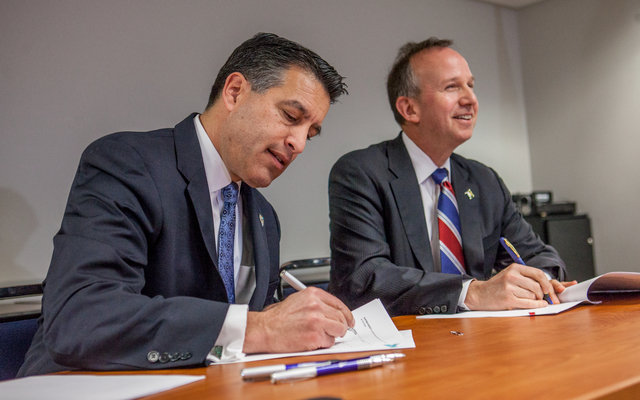Return on investment for Internet gaming operations in three states no windfall

Apparently, the only folks making money from the United States’ fledgling Internet gaming market are lobbyists.
That won’t change anytime soon. Bills for and against Internet gaming continue to surface in statehouses and Congress, which means more billable hours for the lobbying sector.
So far, the return on investment for casino operators who have launched Internet gaming in three states hasn’t been the billion-dollar windfall some predicted.
Deutsche Bank gaming analyst Andrew Zarnett, in a presentation to the Annual Forum on U.S. Online Gaming this month, said the American market could reach $2 billion by 2020; that is if California approves online poker coupled with other states legalizing the activity.
Statewide lotteries could also have a place in online gaming operations.
“Lottery games, over time, will look more and more like casino games,” Zarnett said.
Based on current numbers, however, the $2 billion projection appears to be a ways off.
Nevada, which offers just poker to its online customers, averaged $850,000 a month in gaming revenue since going live a year ago. Delaware, which has casino games in addition to poker, had its best month ever in March — $206,833 in revenue, an increase of 25 percent over February.
As for New Jersey, the numbers have been healthy, although not the windfall imagined by state leaders. In March, the six Atlantic City casinos offering Internet gaming grew revenue 15.2 percent to $11.9 million.
“We remain relatively cautious with regards to both online gaming revenue expectations and more importantly profitability,” Macquarie Securities gaming analyst Chad Beynon told investors in a recent research note.
At least 10 states are considering legalizing Internet gaming this year. Some are further along than others. Positive sentiment has been expressed in Massachusetts and Illinois statehouses, a poker-only bill was introduced in New York and California’s poker-only legislation is slowly moving forward.
That’s a good sign for online gaming proponents, Beynon said, since federal online poker legislation is a long shot.
“At this point, Internet gaming remains a nascent business with many states watching,” Beynon said.
There is little bipartisan backing for either of the two pro-online gaming bills in the House — one that would legalize all forms of gambling on the Internet and another that is poker-only.
Meanwhile, Senate legislation offered by Lindsey Graham, R-S.C., with a companion bill in the House by Rep. Jason Chaffetz, R-Utah, would ban all online gaming — including poker — but that bill doesn’t have overwhelming support either.
Passage of the Graham-Chaffetz bills would end Nevada’s neophyte online gaming business — as well as shut down games in New Jersey and Delaware. That news didn’t sit well with Nevada Gov. Brian Sandoval. He said individual states should be allowed to decide their path in the online gaming arena.
Meanwhile, Capitol Hill lobbyists on both sides of the debate are cashing in.
Las Vegas Sands Corp. Chairman Sheldon Adelson — who has vowed to dip deep into his heavy wallet and spend whatever it takes kill online wagering — funded the Coalition to Stop Internet Gambling. The group hired former New York Gov. George Pataki, ex-Denver Mayor Wellington Webb and retired Sen. Blanche Lincoln, D-Ark., to head the cause.
Not to be outdone, MGM Resorts International, Caesars Entertainment Corp. and the American Gaming Association are paying the bills for the pro-Internet gaming Coalition for Consumer and Online Protection. The organization has its own paid spokespeople: ex-Rep. Mary Bono, R-Calif., and former Rep. Mike Oxley, R-Ohio.
Apparently, some lobbyists sold themselves to the highest bidder.
As reported this month by political pundit Jon Ralston, Bono initially offered to work for Adelson’s side before joining the pro-online gaming forces. Meanwhile, Dickstein Shapiro, a large law firm with a lobbying component, initially pitched its services to Caesars before signing on with Adelson.
There are no loyalties.
“From a federal standpoint, with increased noise on both sides of the table, it appears increasingly more likely that little progress in either direction will be made during the balance of the year,” Beynon said.
There is one aspect of the anti-Internet gaming legislation that would be hard for a lobbyist to contend with.
Let’s suppose the Graham-Chaffetz bill makes it through both houses of Congress and winds up on the desk of President Barack Obama, awaiting his signature.
All an aide has to whisper to the president is, “that anti-online gaming measure is backed by the billionaire Las Vegas casino owner who spent $100 million to try to defeat you in 2012.”
How fast will it take for the president to stamp VETO on the bill?
Howard Stutz’s Inside Gaming column appears Wednesdays and Sundays. He can be reached at hstutz@reviewjournal.com or 702-477-3871. Follow on Twitter: @howardstutz.












